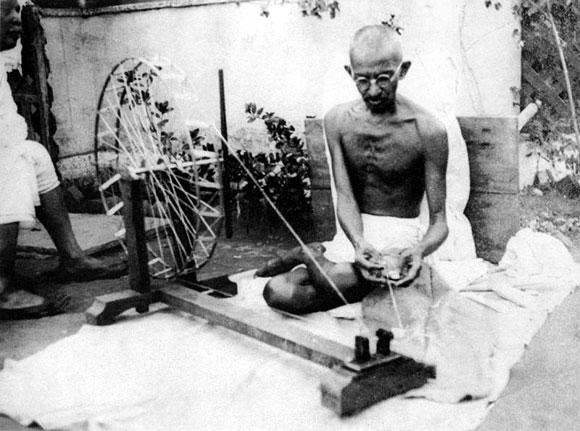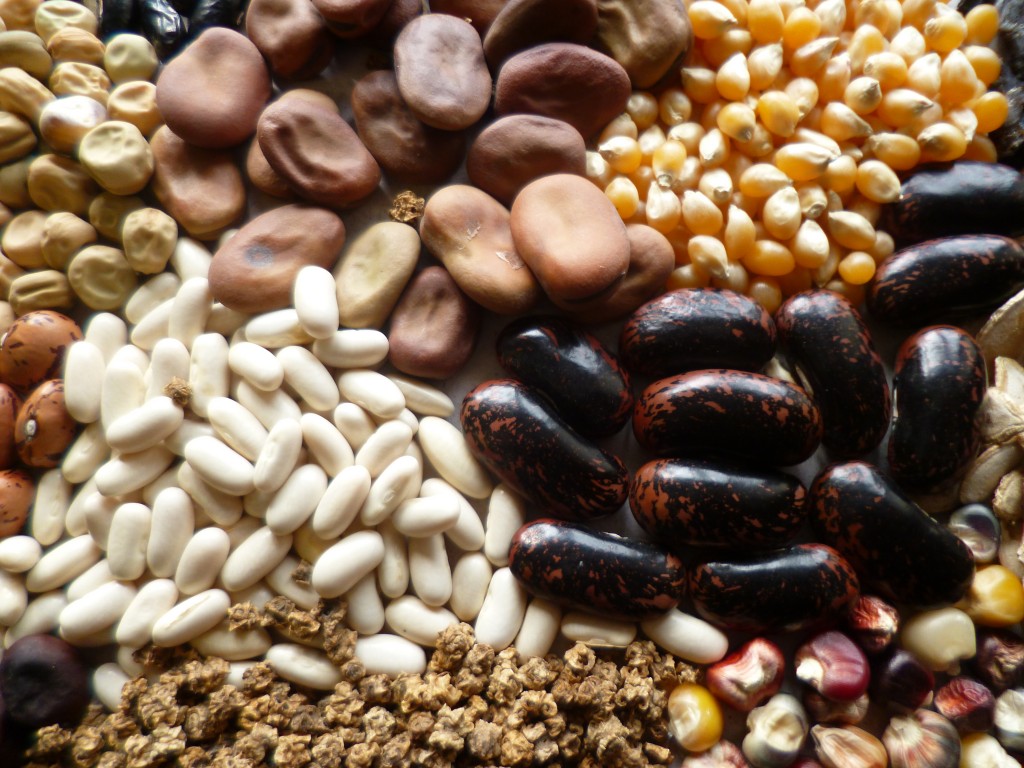
He asked her to show him how to use it, and then he travelled around the countryside teaching other folks how to spin their own cloth. The spinning wheel worked as a tool for liberation, Gandhi said, precisely because it was so small. Anyone could use it. We now live in a world of global trade, commoditized and subsidized toxic agricultural systems, genetically engineered seeds, and exploitative politics in the name of GDP (Gross Domestic Product), the God of limitless growth. In the last year, six of the largest corporations on earth merged, leaving in the wake of that tsunami 3 corporations--Monsanto/Bayer, Dow/DuPont, and Syngenta/ChemChina--in control of roughly 70% of the world's seeds. However, they are not seed companies. They are chemical companies. Their job has always been to sell chemicals, and after wartime munitions plants shut down, they looked to agriculture as a potential new market. We haven't always farmed with chemicals. In fact, the experiment of chemical agriculture has only been in going on for last 70 or so years, while our ancestors farmed without them for 10,000 years or so, and many folks (like us!) still do today.
But if you're a chemical company, your job is to figure out how to sell chemicals. Thus ramped up, in Dr. Shiva's words, the "War on the Earth". The Poison Cartel, as she refers to these now-3 chemical corporations, led a successful campaign to convince governments, educational institutions, farmers, banks, and consumers that indeed the ONLY way to "feed the world" is by dumping ever more toxic chemicals onto the soil. Period. And when the living seed got in the way of that agenda, they modified it to either contain a poison or to be able to withstand being sprayed with a poison. In her keynote this weekend, Dr. Shiva said, "We do not have a seed industry--we have a chemical industry at war with the seed." Now we've got a 6,500 square mile dead zone at the mouth of the Gulf of Mexico where the Mississippi River, simply doing her duty, has carried poisons from thousands of chemical farms downstream. Poisoned groundwater, an epidemic of diet related diseases, family farmers in bankruptcy, rising inequality, and a government willing to throw its citizens under the bus have converged into the mess we find ourselves in today. They've poisoned the soil. They've poisoned the water. They've poisoned the seed. They've poisoned our bodies. And they've poisoned our democracy. Whew. Time to get back to Gandhi. Dr. Shiva describes her moment of enlightenment as she puzzled over this huge nest of interconnected environmental, political, and health problems, all of which point to the humble yet powerful seed. As Rocky Mountain Seed Alliance director Bill McDorman says, when you choose a seed, you choose an entire agricultural system. If we want to be free, the seed must also be free, because we are literally of the seed, alive only by the gift of her sustenance. Vandana Shiva defines seed freedom as 3 things:
1. The freedom of the seed to evolve.
As agriculture has become more mechanized, we have replaced farmers with machines. If the farm is to be as efficient as a factory, it must be standardized and uniform. Seeds are of course not inert--they are alive, and their health comes in their diversity and adaptability. A seed is remarkable in its ability to take in information about its environment and pass down adaptations to its seed children. As we grow seeds in Idaho, each season they are adapting to our little corner of the earth.
The problem with having multinational corporations in control of our seeds is that they approach agriculture like a multinational corporation. If the goal is huge-scale industrialized, mechanized monoculture, the seeds that make that system possible will need to all germinate at the same rate, be uniform in size and days to maturity, respond positively to industrial inputs, and work well in industrial harvest and processing systems. When such big money is poured into breeding plants with these characteristics, it keeps seeds from being able to evolve on their own terms. As Dr. Shiva says, "Life is self-organized, and nothing self-organized tends toward uniformity." So they're shoving the seeds into these genetically narrow boxes which make them less able to perform under diverse weather or biological conditions, which are certain to become more prevalent as climate change accelerates. By saving seeds in a "low-input" system like ours where we are not adding synthetic fertilizers or pesticides, the seeds are evolving to thrive in that system. As small-scale seed producers and farmers, we are not interested in complete uniformity, we are interested in plants and populations of plants that continue to produce food for us in varying weather, water, and cultural conditions so we always get some food from our fields.
2. The freedom of farmers to use, grow, save, and exchange seeds.
The simple fact that for thousands of years farmers have saved and replanted seeds each year is a real problem if you want to make money selling them seeds (and the chemicals that go with them). For years, activists like Dr. Shiva have fought to keep the so-called "Terminator technology," a process that makes the seeds in a plant sterile and unable to reproduce (thereby forcing farmers to buy them anew each year), illegal. Still, patents on seeds effectively do the same thing, requiring farmers to pay royalties to the corporations that sell them the seeds each year. All over the world folks have had to vigilantly resist proposed laws which make saving or exchanging seeds illegal. This was one of the most profound but difficult insights I gained this weekend. These corporations are ABSOLUTELY in the business of taking away the rights of people around the world to save their own seeds.
I suppose I knew this, but I didn't totally believe it until Dr. Shiva hammered us with example after example of that very thing. She explained that natural disasters where farmers lose their seeds make them exceptionally vulnerable to predation by multinational corporations. She talked about a gift of seeds she and the other farmers at her Navdanya seed cooperative put together at the request of Nepali farmers after the terrible earthquake, that sat at the border for a month waiting for government clearance to get through. They were told there were laws that wouldn't allow the seeds to come in, but when she actually looked into it, there were no such laws on the books. Rather, Monsanto had made an official-looking form and distributed it to customs officials at the border prohibiting the entry of seeds. These companies see natural disasters as a way to open up new markets, to lock farmers into the treadmill of having to buy seeds from the company every year rather than saving their own as they have done for generations. There is so much more to document about these issues, including laws that prohibit seed libraries (in the United States), laws that require people to pay hundreds of dollars to register seed varieties in a national database before they can be offered for sale (in Europe), and IMF/World Bank laws that force countries to grow industrialized commodity crops for export markets rather than food for their own people (in much of the developing world). For more information about the very real struggle for seed freedom, along with many uplifting and fascinating stories from the seeds and their caretakers, check out the superb documentary Seed: The Untold Story.
3. The freedom of the eater to have access to a biodiverse diet of healthy food.
It's common knowledge at this point that our food system is very broken. As consumers, we are kept in the dark about many aspects of what goes into the bringing of food to our tables. As a rule, we do not actually know what we are eating. If a corporation is in business of convincing us we need chemical agriculture to feed ourselves, it must also work to assure that we nearly exclusively have access to the food they control, regardless of how it affects our health or communities. As a result, we are suffering from an epidemic of diet-related diseases due to lack of access to healthy food and skewed education about which food will actually bring us health. The US government's own website states that over half of the adult population suffers from one or more diet-related diseases. But it is not only the nearly $400 billion these diseases cost us that we're paying for. Through our taxes, we pay billions of dollars a year in agricultural subsidies to this exact, broken system, with 75% of them going to less than 10% of farms. This, plus all the money we pay in taxes that go to subsidies to the fossil fuel industry have created a system where somehow it is cheaper to buy a package of Doritos, which contains 20+ ingredients, all gleaned, processed, and combined from various corners of the world, put in a pre-made shiny package which itself contains whatever ungodly number of materials, all mined and trucked from somewhere, than it is to buy a bunch of carrots grown in your own town. This is not because local farmers are greedy, money-hungry snobs who are trying to rob you of your hard-earned cash. It is because there is no such thing as a "free market", and we do not live in a democracy. We live under an oppressive regime of, by, and for 1% of people at the expense of the 99% and the earth...in my humble opinion. So what do we do about it? An easy start to that answer is quite simple. Dr. Shiva articulated it this way:
"You want to stop Trump? Save seeds."
"You want to save the earth? Eat a diverse diet."
 Photo: Flickr / Creative Commons / Toni Fish
Photo: Flickr / Creative Commons / Toni Fish
Right about now, you might be thinking, "Wait! So she's saying that if I want to bring down oppressive regimes and create an abundant economy and world grounded in care for the earth and care for people, I can do that by eating a diet of diverse foods? Sounds too good to be true, and if it sounds too good to be true....I know a scam when I see one." Well, for some much-needed context, check out Part II of this saga! 



